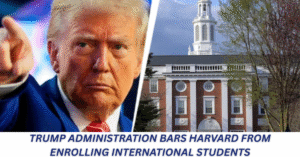Harvard Hit by Trump Ban: 1000’s of International Students at Risk
A Shocking Blow to U.S. Higher Education: In a move that has sent shockwaves across the global academic community, the Trump administration has revoked Harvard University’s certification to enroll international students. This decision, announced on May 22, 2025, effectively bars one of the world’s most prestigious universities from admitting foreign students under the Student and Exchange Visitor Program (SEVP).
This action directly impacts approximately 6,800 international students, roughly 27% of Harvard’s student body, leaving them in a precarious legal and academic position. Here’s everything you need to know about the controversy, the reasons behind it, and the global fallout.
Harvard Hit by Trump Ban: Why the Trump Administration Revoked Harvard’s SEVP Certification
The Department of Homeland Security (DHS), under Secretary Kristi Noem, claims that Harvard failed to comply with federal requests regarding international students’ activities. The administration accused Harvard of:
- Failing to report essential information under SEVP regulations
- Fostering a supposedly unsafe campus environment
- Allegedly supporting antisemitic sentiments
- Collaborating with the Chinese Communist Party (CCP)
Despite the severity of these claims, the DHS has not presented concrete evidence to back these allegations. Critics, including civil liberties groups and education experts, argue that the move is politically motivated and part of a broader campaign against elite academic institutions perceived to hold liberal values.
Harvard’s Strong Response: Legal Action Imminent
Harvard University wasted no time in condemning the Trump administration’s decision. In a strongly worded statement, the university called the revocation:
“A politically charged and unlawful attack on academic freedom and international collaboration.”
University President Claudine Gay emphasized Harvard’s commitment to diversity, inclusion, and global education, asserting that legal steps are already underway to challenge the SEVP revocation in court.
Harvard is preparing a coalition of legal experts, peer institutions, and advocacy groups to combat what they consider a clear abuse of executive power.
Impact on International Students in the U.S. By Trumps Ban
The fallout from this decision is already being felt across campuses and consulates worldwide. Students who had already secured visas for upcoming semesters now face uncertainty. The decision also casts doubt on the future of international students currently enrolled, who may be forced to transfer or even leave the country if Harvard’s certification isn’t reinstated.
Many affected students have expressed fear, anxiety, and confusion, as this move jeopardizes not only their education but also their immigration status and career prospects in the United States.
Wider Implications for the U.S. Education System
This development is not just about Harvard. The decision could set a dangerous precedent for how political ideologies influence U.S. higher education policy. Experts warn that the revocation could:
- Discourage top international talent from applying to U.S. universities
- Shrink the $44 billion international education industry
- Damage the global reputation of American academic institutions
- Fuel brain drain to countries with more stable academic policies like Canada, Australia, and the UK
International students bring not just economic benefits but also cultural diversity and global perspectives essential for academic innovation.
A Political Agenda Against Liberal Academia?
Many political analysts believe this decision is part of the Trump administration’s ongoing clash with elite academic institutions. Past efforts include:
- Threats to revoke tax-exempt status for universities deemed politically biased
- Attempts to influence curriculum decisions under the guise of national security
- Withholding federal funds from institutions criticized for ideological leanings
By targeting Harvard—a university often associated with liberal viewpoints—this action is viewed by many as a calculated attempt to score political points rather than enforce meaningful immigration policy.
International Reaction on Trump Ban for International: Condemnation and Calls for Action
The global academic community has not remained silent. Universities across Europe, Asia, and the Middle East have issued public statements of solidarity with Harvard. Education ministers in countries such as India, China, and Germany have criticized the U.S. for undermining the principles of academic freedom and global cooperation.
Even American universities such as MIT, Stanford, and Yale have called the action “unprecedented and damaging.”
What’s Next after Trump Ban 2025?
Legal experts predict that the Trump administration’s move will face intense legal scrutiny. Harvard’s legal team is reportedly preparing to challenge the revocation on grounds of:
- Lack of due process
- Discrimination based on national origin
- Violation of academic and constitutional rights
If Harvard succeeds, it could set an important precedent that protects academic institutions from political overreach in the future.
A Critical Moment for Global Education
The Trump administration’s decision to bar Harvard from enrolling international students represents more than just an immigration policy shift—it symbolizes a potential turning point for U.S. higher education. As legal battles begin and international outrage grows, the world watches closely.
Will Harvard be able to overturn this controversial decision? And what will be the long-term consequences for America’s standing as a global leader in education?
One thing is clear: this is not just Harvard’s fight—it’s a battle for the soul of academic freedom in the United States.

